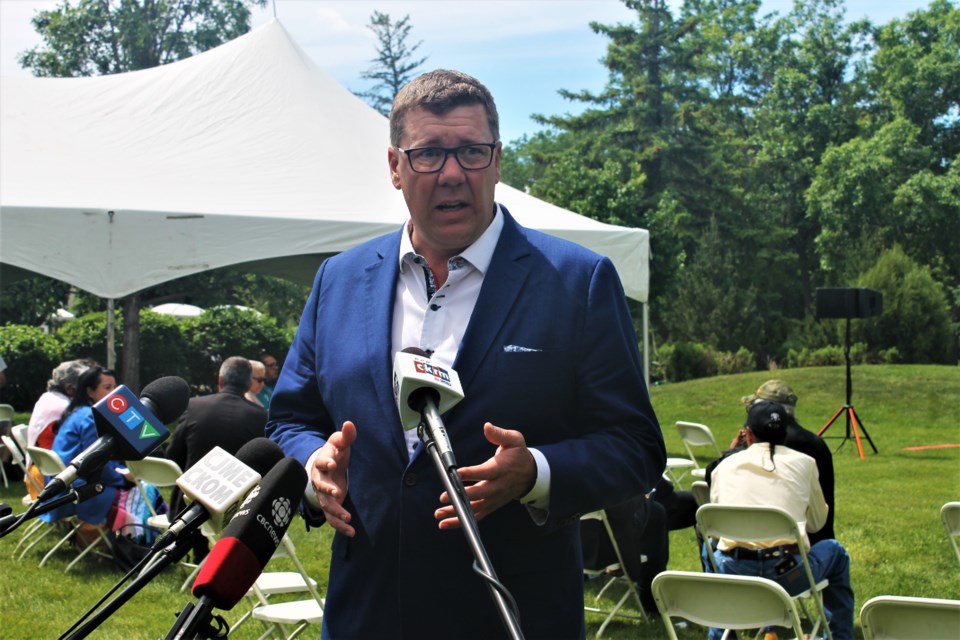REGINA — Masking mandates and vaccination requirements will be the responsibility of private businesses and public venues in Saskatchewan, said officials Monday, and will not be mandated as a provincial measure.
Premier Scott Moe and Chief Medical Health Officer Dr. Saqib Shahab publicly addressed the current COVID-19 situation in the province Monday for the first time since July, following repeated calls of concern about the Delta variant.
Active cases in Saskatchewan have risen from 496 on Aug. 1 to more than 2,060 on Aug. 31, according to public health data, with largely unvaccinated individuals reported to be testing positive and being hospitalized due to COVID.
Currently, Moe said the province is not considering implementing stricter public health orders similar to those previously in place, including a province-wide indoor masking policy or vaccination requirements.
“That would be grossly unfair to the vast majority of Saskatchewan residents that have made the right decision and have gone out and gotten themselves vaccinated,” said Moe.
Manitoba and B.C. have both reinstated public masking mandates in response to what some experts are calling the fourth-wave of the pandemic.
When asked why Saskatchewan is not following suit, Moe said that while such policies do provide a “layer of protection” for reducing transmission, he also described them as a “stop-gap measure.”
“When you pull those public health measures away, you're faced with the very same challenge that you were [facing] prior to putting them in,” said Moe.
Moe said that instead of the province making them do so, people feeling uncomfortable in public spaces can independently choose to wear a mask in public, as a personal safety decision.
He also said that proof-of-vaccination policies in public spaces will also be the decision of individual businesses, venues and organizations.
“We are transitioning, here in Saskatchewan, to how best we can live with this virus that is present in our communities,” said Moe. “We need to learn how to manage it as best we can.”
Several notable places have already announced vaccination requirements in Saskatchewan, including both the University of Saskatchewan and Regina, Saskatchewan Polytechnic, the Roughriders, and a handful of music venues in Saskatoon and Regina.
The provincial government is willing to work with any private businesses or venues looking to implement such policies, said Moe, but it will be up to them to develop and enforce them.
Vaccination records, including the COVID-19 vaccine, are currently available to residents through their eHealth Saskatchewan profiles, which can be printed or saved digitally to use as proof.
The Ministry of Health is also working on developing a QR code that provides an individual’s COVID vaccination record, expected to launch in mid-September.
Moe also indicated that economical considerations were also made in the decision to reject a public vaccination requirement.
He said that a provincial mandate to check vaccination status at the door of all public spaces could cause financial strain on businesses lacking the resources to do so — like those struggling with employee shortages or ongoing impacts from previous shutdowns.
“The operational ability to put this in place on the ground in the retail sector [for example] is quite different from what we're seeing with those [larger] organizations coming forward,” said Moe.
Overall, the province’s continued message to residents is to voluntarily seek vaccination from public health, despite data showing that rates in Saskatchewan have slowed significantly.
More than 300,000 residents, or approximately 30 per cent of the population, remain unvaccinated or not fully vaccinated, said Moe.
“We are in the fourth wave largely because we still have a few hundred thousand people in this province that have not made the choice to get vaccinated,” said Moe.
However, Moe said that even without a provincial order, the government feels that private vaccination policies will be enough to encourage residents to do so moving forward.
“It’s going to be increasingly more uncomfortable, in Saskatchewan, to make the choice to not be vaccinated,” said Moe. “If they choose not to be vaccinated, they're going to have to produce multiple and repetitive negative tests [and] this means there's going to be events that you're not going to be able to attend without a negative test.”
“We feel this is providing leadership on both fronts, and it's not implementing the heavy hand of government on its citizens,” Moe continued.
An announcement released in conjunction with the press conference shared some measures to be taken by the provincial government, including the continued push for vaccination.
Booster shots will soon be available, said Shahab, with a program set to start on Sept. 7 beginning with long-term care residents and immunocompromised individuals.
Health care workers employed within the Saskatchewan Health Authority will also be required to be vaccinated, provided a policy can be agreed upon following collaborations with union representation.




